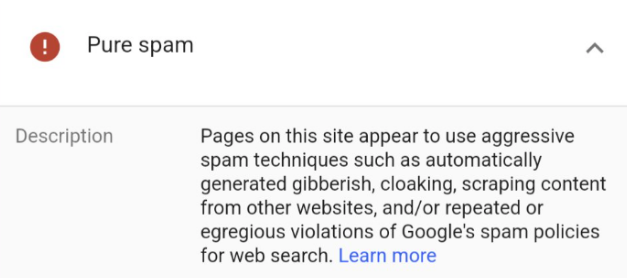On March 5th, it was announced that Google were breaking ground on their March 2024 core algorithm update — and that it was going to be larger and more complex than the core updates of recent memory.
The core update coincides with a spam policy update, as well as associated but separate actions to remove low-quality content from Google’s results pages.
In this article, we tell website owners everything they need to know about the March 2024 core algorithm update and Google’s related initiatives.
Overview in brief
- Google’s March 2024 core algorithm update and associated spam policy updates focus on removing low-quality content from the SERPs, as well as content that Google decides exists primarily to manipulate search results.
- Thousands of websites have been deindexed, all of which featured AI-produced content.
- Website owners should review the content on their sites and ensure its compliance with Google’s E.E.A.T principles and updated spam policies.
An overview of Google's March 2024 core algorithm update
Google’s March 2024 core algorithm update is designed to remove low quality content from results pages. If content is produced primarily to attract clicks and manipulate search engine rankings, it's in Google's crosshairs.
The update involves significant changes applied across several of Google’s core systems and will introduce additional signals and mechanisms to enhance the technical proficiency of the platform’s content quality assessments.
In essence, this update marks the complete incorporation of Google’s helpful content system into its primary ranking algorithms.
According to Google’s evaluations and predictions, it should clear as much as 40% of the low-quality, unoriginal content from search results. That’s a significant chunk! However, many website owners can breathe easy, as Google reports that ‘There’s nothing new or special that creators need to do for this update as long as they’ve been making satisfying content meant for people.’
A note on SERPs volatility
Google has warned that, due to the complexity of the March 2024 core update compared to previous updates, there may be more SERPs volatility than usual while ‘different systems get fully updated and reinforce each other.’
Search volatility doesn’t impact every website, but if you notice in Google Analytics 4 that your website does seem to be caught up in the turbulence of the Google update, there’s no need to panic.
Dropping a few ranks here and there doesn’t mean your site is being penalised by Google, nor is it necessarily an indication of poor SEO or content.
Google's new spam policies explained
In conjunction with the March 2024 core algorithm update, Google is moving forward with a SpamBrain update and changes to their spam policies across the following areas:
- Scaled content abuse
- Expired domain abuse
- Site reputation abuse
What is scaled content abuse?
Picture a factory churning out cheap, low-quality, mostly machine-made products in their thousands. Now replace ‘factory’ with ‘website’ and ‘products’ with ‘content’, and you should have a pretty good idea of what scaled content abuse is and the types of websites responsible.
What does this mean for AI-assisted content creation?
In terms of scope, Google has emphasised that this element of their policy updates will address the spread of low-quality, unoriginal content, regardless of how it’s created.
Consequently, not all content developed with the help of AI will incur penalties; what matters to Google is the quality and originality of the content.
That said, heavy automation is often clearly observable in low quality, low value content across the web. This - as we’ll discuss later - is why many of the websites already impacted by these changes feature an abundance of content produced by artificial intelligence.
Google has also shared that the updated policy extends to more sophisticated low quality content generated in high volumes, which may not be immediately recognisable as automated.
What is expired domain abuse?
Expired domain abuse is an ill-advised shortcut to visibility on the SERPs. It goes like this:
- Someone purchases an authoritative expired domain.
- They repopulate the website with irrelevant or low quality content.
- This new content gets an easy ride to a respectable rank on SERPs because of the pre-existing clout of the domain.
- Users click through to find useless content.
- The person responsible gets the benefits of the clicks, i.e. ad revenue, etc.
Understandably, Google is keen on cracking down on this shortcut, so part of the new update centres around improving expired domain abuse detection.
What is site reputation abuse?
Site reputation abuse is a similarly parasitic means of manipulating search results. But, instead of expired domains, live domains are the hosts.
It involves individuals other than the site owner or manager generating webpages on the owner's website. This tactic aims to capitalise on the established credibility and authority of the website to elevate the visibility of the new pages.
These pages operate with minimal oversight or involvement from the site owner; in some cases, the owner may not even be aware of their existence.
Examples of third-party pages include:
- Sponsored content
- Advertisements
- Partnership pages that aren’t directly related to the primary purpose of the host website
This policy will not take effect until May 5th, giving website owners plenty of notice to carry out site audits and show any unwanted guests the door.
Will all third-party pages be classed as spam?
Not all third-party pages will fall into this category of spam. According to Google, only that which is ‘hosted without close oversight and which is intended to manipulate search rankings’ will be branded site reputation abuse.
The following are examples of third-party pages that Google does not consider site reputation abuse:
- Press release & wire service sites
- Syndicated news displayed on a news publication site and sourced from another
- Webpages or features meant for user input, such as forum-style websites and comment sections
- Columns, articles, and any other editorial content that is closely overseen by the host site
- Third-party content that aligns with the purpose of the host site, is overseen by the website owner or their team, and is meant to be shared directly with the site’s readership
- Embedded third-party ad units or affiliate links — subject to proper link etiquette
- Coupons connected to and overseen by the host website
The impact of Google's updates: Manual actions & deindexing
During a study carried out by Originalityai. that observed 79,000 content-forward websites indexed by Google following the update announcement, just shy of 2% (1,446 sites) were issued “manual actions”.
Side note: Manual actions are received through the Google Search Console Manual Action dashboard. They are issued to websites when a human reviewer at Google deems certain pages to be at odds with Google’s policies - hence the “manual” part.
The websites in question were subsequently deindexed by Google, meaning they were completely removed from Google’s index and no longer show up in Google search results.
Collectively, the banished sites are estimated to have been generating over 20 million organic visitors a month, equating to substantial sums in lost ad revenue.
What type of websites are being deindexed?
Originalityai. conducted a second study that analysed the 100 most recent articles published on the affected websites. It revealed that all 1446 sites had published AI-produced content — and that 50% had produced upward of 90% of their content using AI automation.
I use AI to assist with content creation - should I be concerned?
Google hasn’t provided any specific indication of what they feel separates suitable and unsuitable levels of AI involvement in content production. But the language used in the manual actions received by website owners offers some insight:

Source: Originality.ai
Based on the above, it appears that the only sites at risk of being deindexed are those that are grossly over-reliant on automation.
As it often does, this all boils down to Google’s Helpful Content guidelines. They want to elevate valuable, original content over dime-a-dozen, low quality pieces of content that exist solely to trick Google’s ranking systems into giving them a prime piece of SERPs real estate.
Site owners that use AI tools to supplement rather than completely outsource content production will likely be unscathed by these Google updates and can carry on as normal.
What do you need to do to avoid being deindexed?
If you’re concerned about the March 2024 core algorithm and associated updates, it’s essential that you:
- Audit your website, assessing the quality of your content in relation to Google’s latest spam policy updates and their Helpful Content guidelines
- Remove or improve content flagged by the audit as low quality or clearly lacking human input. Google has confirmed that removing low quality content from a website can, to a certain degree, help quality content perform better on their SERPs - so there's a silver lining here
- Adopt a more human-forward approach to content creation and develop a healthy relationship with AI tools, dialling back usage if you feel it has a negative impact on the value of your content
TDMP offers a free and comprehensive website audit as part of our SEO services. Enquire today to book your audit.
The bottom line
Google may be conducting a show of force and raising some alarm bells, but with these updates, the company isn’t saying anything it hasn’t before.
The goal is to encourage the creation of higher quality content, and this is something we can help with on multiple fronts.
Whether you need a website audit or additional assistance with compliant SEO, content marketing, or paid media, Contact TDMP for tailored support.

